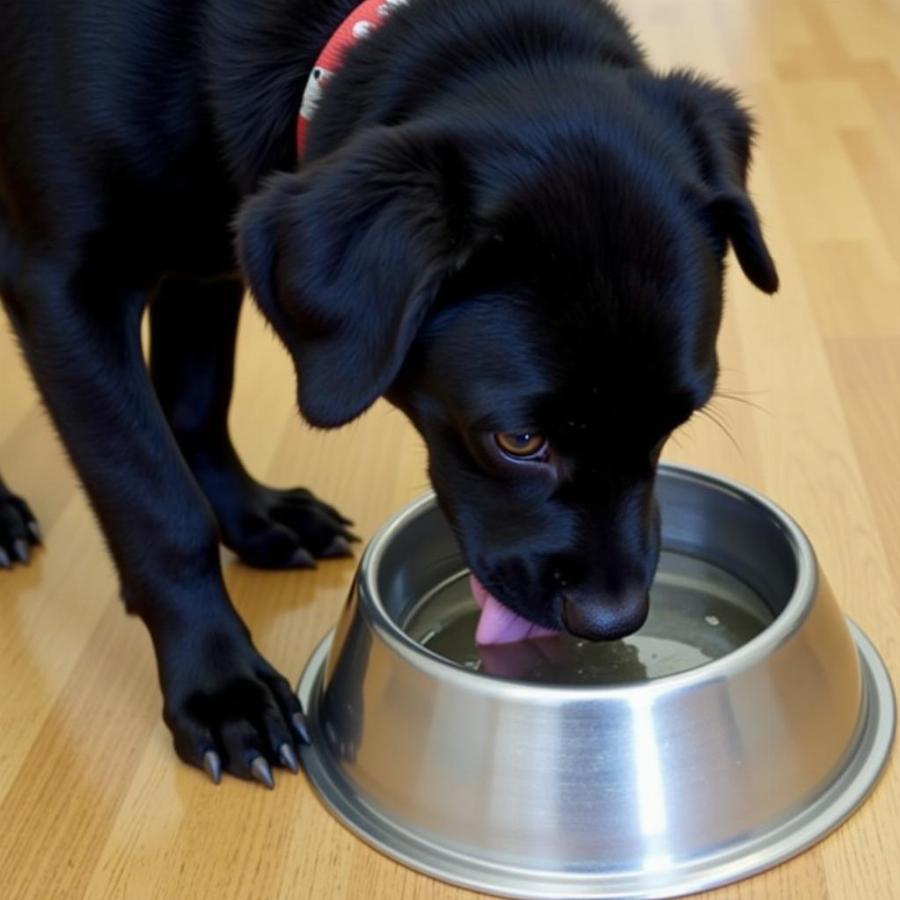We’ve all been there: that sharp, stabbing pain in your forehead after indulging in a cold treat a little too quickly. Brain freeze – it’s a universal human experience. But what about our furry friends? Can dogs experience the same icy sensation, or are they immune to the brain freeze blues?
While our canine companions can’t tell us directly about their experiences with headaches, we can use our knowledge of canine anatomy and behavior to understand if dogs get brain freeze. Let’s delve into the science behind this chilly phenomenon and explore whether our furry friends experience it the same way we do.
Understanding the Science Behind Brain Freeze
That painful sensation we call brain freeze is actually a sphenopalatine ganglioneuralgia. Quite a mouthful, right? Here’s the simplified version:
- Rapid Cooling: When you eat or drink something cold too quickly, it chills the blood vessels in the roof of your mouth.
- Blood Vessel Constriction: These blood vessels react to the cold by constricting (narrowing).
- Pain Signals: This rapid constriction triggers nerves in the palate to send pain signals to the brain.
- Referred Pain: Your brain interprets these signals as pain in your forehead, even though the source is in your mouth.
So, Can Dogs Feel It Too?
Given that dogs have the same basic neurological wiring as humans, it’s highly likely they experience a similar sensation. While we can’t ask them directly, we can observe their behavior.
Have you ever noticed your dog flinching or pawing at their mouth after lapping up a cold drink on a hot day? This could be their version of expressing the discomfort of a brain freeze.
Should You Be Worried About Giving Your Dog Cold Treats?
A little brain freeze is generally harmless and short-lived, both for humans and dogs. However, it’s best to err on the side of caution.
- Moderation is Key: Just like with any treat, offer cold treats in moderation.
- Monitor for Discomfort: If you notice your dog consistently showing signs of discomfort after consuming cold items, it’s a good idea to avoid them.
 Labrador Retriever drinking water from a bowl
Labrador Retriever drinking water from a bowl
Tips for Preventing Brain Freeze in Dogs
While a mild brain freeze isn’t usually a cause for concern, you can take a few simple steps to minimize the chances of your furry friend experiencing this chilly discomfort.
- No Gulping: Encourage your dog to lick or eat cold treats slowly, rather than gulping them down in one go.
- Consider Temperature: Avoid giving your dog frozen treats or ice-cold water, especially during colder months. Opt for cool, rather than freezing, temperatures.
- Water Alternatives: Offer your dog alternatives to ice-cold water, such as water at room temperature or a dog-specific water fountain.
When to Consult Your Vet
If your dog shows any unusual symptoms after consuming something cold, such as vomiting, diarrhea, lethargy, or loss of appetite, contact your veterinarian immediately. These signs could indicate a more serious condition that requires medical attention.
Conclusion
While we can’t know for sure what’s going on inside our dog’s head when they enjoy a cold treat, it’s plausible that they experience brain freeze similar to us. By observing their behavior and practicing moderation, you can help your furry friend beat the heat safely and enjoy their treats without any unpleasant icy surprises.
For more information on keeping your dog happy and healthy, explore our other articles on head pressing in dogs or learn if can dogs have salmon skin.
FAQs
1. Do all dogs experience brain freeze the same way?
Just like humans, dogs may have different sensitivities to cold. Some dogs might not react at all, while others might show more pronounced signs of discomfort.
2. How long does brain freeze last in dogs?
Brain freeze is typically a very brief sensation, lasting only a few seconds to a minute.
3. Are there any breeds more prone to brain freeze?
There’s no evidence to suggest that certain breeds are more prone to brain freeze. However, brachycephalic breeds (dogs with flat faces, like Bulldogs and Pugs) might be more sensitive due to their facial structure.
4. Can I give my dog ice cubes?
While a few ice cubes are generally safe, it’s best to offer them in moderation. Chewing on ice can potentially damage your dog’s teeth.
5. What are some safe and enjoyable cold treats for dogs?
Consider frozen dog-safe fruits like blueberries or watermelon chunks, plain yogurt popsicles, or commercially available frozen dog treats.
Explore More Dog Care Tips
Beaut Dogs is your trusted source for all things dog-related. We are committed to providing insightful and reliable information to help you provide the best possible care for your furry companion. For personalized advice and support, contact us at [email protected]. Let Beaut Dogs be your guide to a happier, healthier life with your canine best friend!